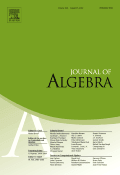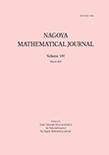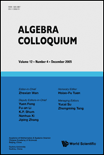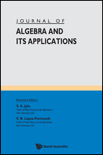
JOURNAL OF ALGEBRA
Scope & Guideline
Exploring the Depths of Algebraic Theory
Introduction
Aims and Scopes
- Group Theory:
Research articles covering various aspects of group theory, including finite groups, infinite groups, and their representations. Topics often include character theory, subgroup structure, and automorphism groups. - Ring Theory:
Studies related to ring theory, including properties of rings, modules over rings, and applications to algebraic geometry and number theory. This includes investigations into special types of rings such as Gorenstein rings and their homological properties. - Algebraic Structures:
Exploration of various algebraic structures such as algebras, Lie algebras, and Hopf algebras. This encompasses research on their representations, cohomology, and applications to mathematical physics. - Homological Algebra:
Papers focusing on homological methods in algebra, including derived categories, Ext and Tor functors, and their applications in both pure and applied mathematics. - Noncommutative Algebra:
Research on noncommutative algebraic structures, including quantum groups and noncommutative geometry, highlighting their algebraic properties and applications. - Algebraic Geometry:
Articles that bridge algebra and geometry, particularly those involving algebraic varieties, schemes, and their connections to algebraic structures. - Combinatorial Algebra:
Investigations into combinatorial aspects of algebra, including the study of algebraic objects via combinatorial techniques and structures.
Trending and Emerging
- Quantum Algebra:
There is a growing interest in quantum algebra, particularly in relation to quantum groups and quantum algebras. This trend reflects the increasing importance of these structures in both pure mathematics and theoretical physics. - Homological and Derived Categories:
Research focusing on derived categories, triangulated categories, and homological methods is on the rise, with many articles exploring their applications in various algebraic contexts. - Noncommutative Geometry:
The emergence of noncommutative geometry as a significant field of study is evident, with papers discussing its algebraic foundations and implications for other areas of mathematics. - Categorical Algebra:
The application of categorical methods to algebraic problems is gaining traction, with an increasing number of articles utilizing category theory to provide new insights into traditional algebraic structures. - Algebraic Topology and Its Interactions with Algebra:
There is a notable trend towards exploring the interplay between algebraic topology and algebra, particularly through the study of algebraic invariants and their topological implications.
Declining or Waning
- Classical Group Theory:
Research on classical groups, particularly in the context of finite groups and their character theory, has seen a decrease in the number of submissions, possibly due to the saturation of existing knowledge and the emergence of more specialized areas. - Elementary Number Theory:
Papers specifically addressing elementary number theory topics have become less frequent, indicating a potential shift towards more advanced algebraic structures and their applications. - Basic Representation Theory:
The basic representation theory of groups and algebras appears to be declining, as more researchers are focusing on deeper and more complex representations, such as those tied to quantum groups and modular representations.
Similar Journals

Documenta Mathematica
Pioneering Insights in Mathematics Since 1996Documenta Mathematica is a premier academic journal published by the European Mathematical Society (EMS), making significant contributions to the field of mathematics since its inception. With an Open Access model established in 1996, the journal ensures that scholarly works are freely available to a global audience, promoting widespread dissemination of mathematical research. Based in Germany, it serves as a vital platform for mathematicians, covering a wide array of topics within the discipline, evidenced by its impressive Q1 ranking in the miscellaneous category of mathematics as of 2023. Featuring rigorous peer-reviewed articles that span the latest trends and breakthroughs in the discipline, Documenta Mathematica also retains a commendable position among its peers with a Scopus rank of 163 out of 399, placing it in the 59th percentile for general mathematics. Researchers, professionals, and students alike will benefit from the robust scholarly content and the journal's commitment to advancing mathematical knowledge.

NAGOYA MATHEMATICAL JOURNAL
Exploring Innovative Frontiers in MathematicsNAGOA MATHEMATICAL JOURNAL, published by Cambridge University Press, is a prestigious journal that has been at the forefront of advancing mathematical scholarship since its inception in 1950. With an ISSN of 0027-7630 and an E-ISSN of 2152-6842, this journal has gained recognition for its high-quality research contributions in the field of mathematics, achieving a Q1 classification in Mathematics (miscellaneous) as of 2023. The journal’s impact is further reflected in its Scopus rank of #164 out of 399 in the General Mathematics category, positioning it within the 59th percentile of its peers. Scholars, researchers, and students can access a range of innovative mathematical studies that explore diverse topics, fostering a vibrant dialogue within the mathematical community. By catering to a global audience, the NAGOYA MATHEMATICAL JOURNAL continues to play a critical role in shaping contemporary mathematical discourse and research.

ALGEBRA COLLOQUIUM
Connecting Scholars to the Frontiers of Applied MathematicsALGEBRA COLLOQUIUM is a prominent journal dedicated to advancing the field of mathematics, specifically focusing on Algebra and Number Theory as well as Applied Mathematics. Published by World Scientific Publishing Co Pte Ltd, this journal is based in Singapore and has been a cornerstone in mathematical research since its inception in 1996, with an anticipated convergence through 2024. With an ISSN of 1005-3867 and E-ISSN of 0219-1733, it features rigorous peer-reviewed papers that cover a diverse range of topics within its scope. Reflecting its quality, Algebra Colloquium is ranked in the Q3 quartile in both Algebra and Number Theory as well as Applied Mathematics, indicating its significance amidst a competitive publication landscape. Researchers, professionals, and students looking to stay at the forefront of mathematical innovation will find a wealth of knowledge and research insights within these pages, making it an essential resource for anyone committed to deepening their understanding of algebraic concepts and techniques.

Cambridge Journal of Mathematics
Fostering Collaboration Through Mathematical InquiryCambridge Journal of Mathematics, published by INT PRESS BOSTON, INC, is a premier platform for the dissemination of cutting-edge research in the field of mathematics. With an ISSN of 2168-0930 and E-ISSN 2168-0949, this journal stands out in a competitive academic landscape, currently ranked #58 out of 399 in General Mathematics, placing it in the top 15% within its category according to Scopus metrics. The journal serves as a vital resource for researchers, professionals, and students alike, aiming to foster groundbreaking mathematical inquiries and foster collaboration across disciplines. Published from 2020 to 2024, the Cambridge Journal of Mathematics is committed to maintaining high standards of scholarship, making it an essential read for those who are passionate about advancing mathematical knowledge and its applications.

JOURNAL OF ALGEBRA AND ITS APPLICATIONS
Exploring the Frontiers of Algebra and Its ApplicationsJOURNAL OF ALGEBRA AND ITS APPLICATIONS, published by WORLD SCIENTIFIC PUBL CO PTE LTD, stands as a pivotal resource for scholars in the fields of Algebra and Applied Mathematics. With an ISSN of 0219-4988 and E-ISSN 1793-6829, this journal has been providing a forum for the dissemination of cutting-edge research since its inception in 2008, converging towards a forward-looking timeline extending to 2024. As of 2023, it has earned a commendable Q2 ranking in both Algebra and Number Theory, as well as Applied Mathematics, reflecting its solid impact within the mathematical community. With a Scopus rank of #49/119 in Algebra and Number Theory, and #420/635 in Applied Mathematics, the journal captures significant advancements and applications across various mathematical domains. While it does not operate under an open access model, its comprehensive articles and research outputs are crucial for fostering intellectual dialogue and innovation in academia. Researchers, professionals, and students alike will find this journal an indispensable asset for their scientific pursuits and explorations into the vast field of mathematics.

Mediterranean Journal of Mathematics
Advancing Mathematical Frontiers in the Mediterranean BasinThe Mediterranean Journal of Mathematics, published by SPRINGER BASEL AG, is a prominent platform dedicated to the advancement of mathematical research and education. Since its inception in 2004, this journal has been pivotal in disseminating high-quality research across various fields of mathematics, currently holding a notable Q2 ranking in the miscellaneous mathematics category as of 2023. With its ISSN 1660-5446 and E-ISSN 1660-5454, the journal enjoys a respected position in the academic community, evident by its Scopus rank of 129 out of 399 in General Mathematics, placing it in the 67th percentile. While primarily a subscription-based journal, it remains committed to providing a comprehensive resource for researchers, professionals, and students, fostering dialogue and exploration within the mathematical sciences. The Mediterranean Journal of Mathematics, based in Basel, Switzerland, continues to contribute significantly to the evolution of mathematical theory and practice, marking its relevance as we approach its 20th anniversary in 2024.

MICHIGAN MATHEMATICAL JOURNAL
Fostering Collaboration in Cutting-Edge Mathematical ResearchThe MICHIGAN MATHEMATICAL JOURNAL is a prestigious and influential publication in the field of mathematics, founded by the University of Michigan. With an ISSN of 0026-2285 and an E-ISSN of 1945-2365, this journal is recognized for its high-quality research and has achieved a commendable Q1 ranking in the category of Mathematics (miscellaneous) as of 2023. Published by the esteemed Michigan Mathematical Journal, it provides a platform for the dissemination of innovative mathematical theories and findings, playing a crucial role in advancing knowledge and scholarship within the mathematical community. With coverage spanning from 1996 to 2024, the journal emphasizes rigorous theoretical development and fosters collaboration among researchers, professionals, and students alike. While not an open-access journal, its contributions are invaluable for those looking to stay abreast of cutting-edge mathematical research.

Forum of Mathematics Sigma
Innovative research, limitless possibilities.Forum of Mathematics Sigma is a premier open access journal published by Cambridge University Press that has been at the forefront of mathematical research since its inception in 2013. With a strong emphasis on advancing the fields of mathematics, the journal consistently achieves Q1 rankings across multiple categories, including Algebra and Number Theory, Analysis, and Computational Mathematics. This distinction highlights its impact and relevance within the scholarly community. The journal prides itself on providing a platform for innovative research, fostering collaboration among researchers and practitioners across various mathematical disciplines. Open access publication ensures that cutting-edge findings are widely available to readers globally, enhancing the dissemination of knowledge. With an address in the heart of Cambridge, England, Forum of Mathematics Sigma is dedicated to promoting high-quality research and making significant contributions to the development of mathematics.

CANADIAN JOURNAL OF MATHEMATICS-JOURNAL CANADIEN DE MATHEMATIQUES
Where rigorous research meets mathematical curiosity.Canadian Journal of Mathematics - Journal Canadien de Mathématiques is a prestigious peer-reviewed journal published by Cambridge University Press, which aims to advance the field of mathematics through the dissemination of high-quality research articles. With its ISSN 0008-414X and E-ISSN 1496-4279, the journal plays a pivotal role in fostering mathematical research and collaboration. It has been recognized for its impactful contributions, currently holding a category quartile ranking of Q2 in Mathematics (miscellaneous) for 2023 and sits in the 66th percentile among its peers according to Scopus rankings. As the journal continues its convergence from its inception in 1994 through to 2024, it remains a vital resource for researchers, professionals, and students seeking to stay at the forefront of mathematical developments. The journal does not operate under an open access model, allowing for a curated collection of articles that adhere to rigorous academic standards.

CZECHOSLOVAK MATHEMATICAL JOURNAL
Inspiring Future Generations of MathematiciansCzechoslovak Mathematical Journal is a distinguished academic journal published by Springer Heidelberg, dedicated to advancing the field of mathematics through the dissemination of high-quality research. With an ISSN of 0011-4642 and E-ISSN 1572-9141, this journal has been a pivotal platform for mathematicians and researchers from around the globe since its inception. The journal holds a Q3 ranking in the field of Mathematics (miscellaneous), demonstrating its commitment to providing a forum for the latest mathematical theories and applications, particularly in general mathematics, as indicated by its Scopus rank of #285/399 and 28th percentile in the field. While currently not offering open access options, the journal continues to attract a wide readership by making its valuable content available through traditional subscription models. The Czechoslovak Mathematical Journal serves as an essential resource for researchers, professionals, and students aiming to stay informed about recent developments and breakthroughs in mathematics, with focus years converging from 1995 to 2024.